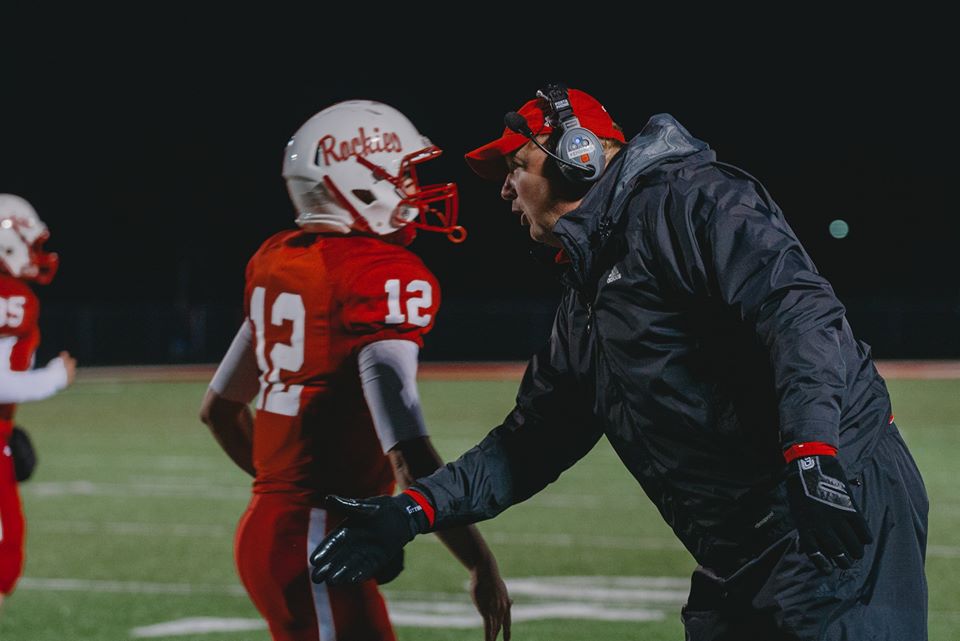PLYMOUTH – For the last 30 years or so there has been a constant in Plymouth football.
Around that time an eighth-grader named Mike Kershner moved into Plymouth and began his football career as a Rockie and just a few years after that, current head coach and then recent college grad John Barron joined Tom Condon’s staff as an assistant coach.
It was about that time that Condon and the Rockies began a run of success that continues to today.
“John’s first year was my freshman year,” said Kershner. “He was young. He was energetic and intense. You loved playing for a guy like that. It’s been a special relationship over the years.”
In those early days, Kershner was also the kind of kid that drew a lot of coaches’ attention.
“We came to Plymouth because of Mike Pettibone’s sister who knew my parents very well,” said Kershner. “He was our neighbor and Kyle (Condon) lived next door so it was like coaches corner where I lived and when you are 6’3″ and weigh 230 in the eighth grade it draws some attention.”
Kershner went on to a very successful career as a three-sport athlete at Plymouth – a catcher on Bill Nixon’s baseball team, center for Jack Edison in basketball, and a standout offensive lineman for Tom Condon’s Rockies.
It was his senior class that set the bar for the current Rockie program.
“We’d had some tough season’s before that,” said Kershner. “We knew things had to turn around and Kyle (Condon, son of the Rockie head coach) and I just said ‘it’s got to turn around somewhere, why not us?’ and we went out to do that.”
“Josh Hutchens was a senior on that team and all he did was win back to back state championships in wrestling,” said Kershner. “Kyle was a wrestler. Those two only knew one way to do things and that was all in. We had some great guys that were younger than us like Phil Bockman and hopefully we led by example. We had some vocal leaders but most of us just wanted to set a positive example.”
While those Rockies didn’t walk away with any championships they set an example for those that would follow.
After his high school years, Kershner went on to play Division I football at Western Michigan and got a taste of what big-time football is.
“It was an eye-opening experience,” said Kershner. “You go from being ‘the guy’ at 6’5″ and 260 in high school and realize that that’s kind of the starting point for a Division I lineman. It was a great experience getting to play Division I in the MAC (Mid America Conference).”
“We played at Auburn when Terry Bowden was their head coach and Steven Davis was their big running back. We played at West Virginia and I think (running back) Amos Zereoué went for 280 on us. We played at Michigan State. It was an incredible experience going from high school to those 80,000 stadiums.”
Kershner went to Western undecided on what his future would be. While there it became obvious to him.
“I didn’t know what I wanted to do,” he said. “We used to do a lot of kids camps and things like that. I really liked being around kids. And you play for guys like Jack Edison and Bill Nixon and you pick up some of that stuff and how much that means to you. I realized that teaching and coaching were going to be a good fit for me.”
The success that occurred after his return to Plymouth made it even easier.
“I came back in 2001 and the next two years we were in the final four,” he said. “We got beat one year by East Noble and the next year by Delta.”
Kershner is now the offensive coordinator of the Rockies and as a former offensive lineman feels he has a unique perspective.
“Everything starts from the ground up,” he said. “If you don’t do your job upfront nothing is going to happen. Those guys up front is where everything starts and I think being one of those guys let’s me see the whole picture and not just what a running back or quarterback sees.”
“Football has changed at Plymouth over the years here,” he said. “We’ve had some good quarterbacks and skilled players but now those guys have a lot more knowledge of the big picture of what needs to happen for an offense to be successful. That big picture is what makes you successful.”
“I really just want guys who play for me to look back and say they learned more than just football,” said Kershner. “We want to win, but there is so much more to it than that. You have kids that might not know where their meal is coming from tomorrow or where they’ll be staying. Those are the kids you want to reach out to and have an impact on.”















